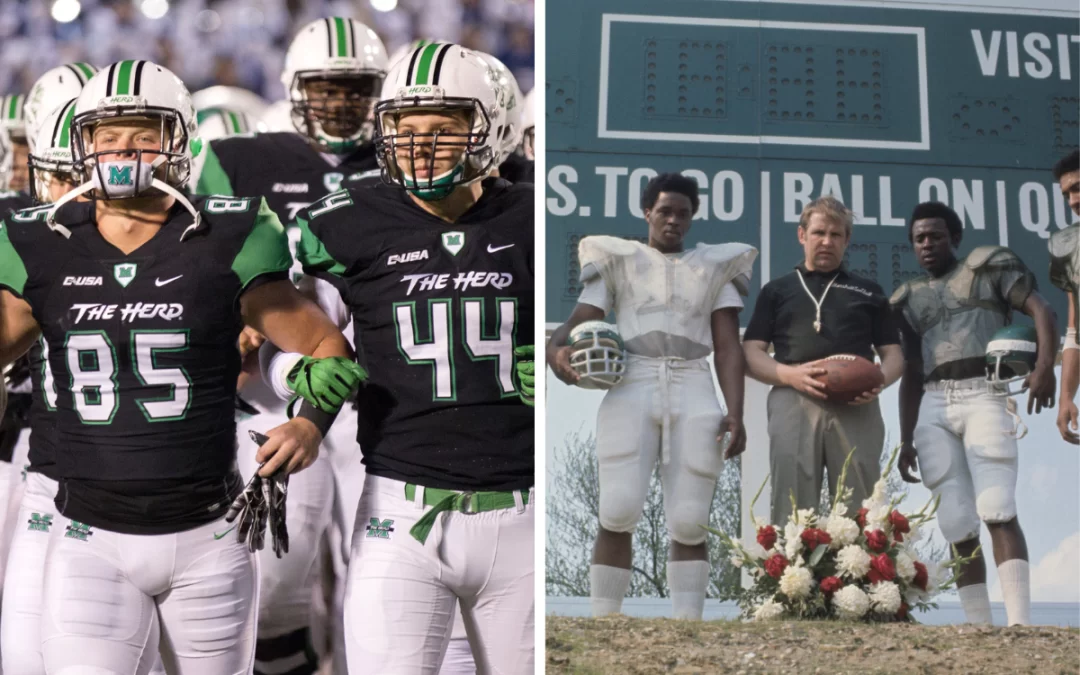“When you’re going through hell, keep going.” Winston Churchill
November 14, 1970 – Huntingdon, West Virginia: It remains the worst tragedy in American sports history. On a rainy, foggy Saturday night, Southern Airways Flight 932 was bringing the Marshall University Thundering Herd football team home to Huntingdon after a close 17-14 loss to East Carolina University.
On the final approach to the Huntington Tri-State Airport, the Douglas DC-9 crashed into a hillside a mile short of the runway and exploded in a fireball. All 75 people on board were killed, including five crew members, 37 football players, eight coaches and 25 prominent school boosters. The athletic director and play-by-play announcer were also on the plane.It was the team’s only charter flight of the season as they typically traveled to games by bus.
The university and the town were devastated. Huntington lost more than its football team. Among the boosters were four doctors and their wives, a state Senator, a city councilman and several business executives from across the state. Seventy children lost at least one parent in the crash and 18 children were left orphaned. Funerals were held for weeks. Six football players were unidentifiable and buried side-by-side at Spring Hill Cemetery close to campus.
University Vice President Don Dedmon, who oversaw the athletic program, had a dilemma. Some University board members thought Marshall should shut down its football program. Others thought the best way to honor the tragedy was to continue, even though they knew how difficult it would be.
An NCAA probation two years earlier added doubt about the program’s future. Marshall had been suspended from the Mid-American Conference for 125 recruiting violations. The program was 8-40 in four previous seasons. When the board met to decide the program’s future, several thousand students and fans gathered outside the building chanting, “We are…MARSHALL! We are…MARSHALL!” The decision: Marshall would field a team in 1971. Somehow.
Dedmon convinced the NCAA, for the first time in history, to allow the school to play freshman players on the varsity team. He contacted a list of potential coaches but got no takers. Jack Lengyel, the head coach at the College of Wooster in Ohio, was the only applicant. He arrived in Huntingdon on March 11, four months after the crash, needing to hire coaches, managers, equipment personnel, and recruit players.
Lengyel pieced together a ragtag team of five varsity players who had not been on the plane, the 1970 freshman team, 25 walk-ons, several ex-servicemen and three basketball players. Only five players had ever played college football.
After losing 29-6 to Morehead State in the opening game, the young Thundering Herd upset heavily favored Xavier 16-13 on the final play of the game, which is still considered the biggest upset in school history. Fans remained in the stadium until midnight. The team finished the season 2-8, but they had fielded a team after the worst event in school history. Lengyel coached at Marshall for four seasons until the four-year scholarship structure was back in place.
In the 1970’s Marshall lost more games than any team in the country. It would be 13 years before they had a winning season in 1984. That was the beginning of an era of success that saw them win 125 games in the 1990s, more than any other school. Marshall dominated the Mid-America Conference, and in 1992 and 1996 the Thundering Herd won the Division I-AA national championship.
The program also produced two Heisman Trophy finalists before transitioning to the larger NCAA FBS division. The old 10,000-seat stadium was replaced with a new 38,000-seat facility. In 2020, Marshall achieved it highest ranking in FBS school history, rising to No. 16 during the season.
Rather than distance themselves from the worst moment in school history, Marshall University embraced it as a show of strength and a way to honor those who died. Perhaps there is not a football team in America that means more to its university, its community and fans than the Marshall Thundering Herd. They refused to quit football when it seemed like the right choice. More than 50 years later, Marshall is thundering on, driven by the tragedy that happened on a hillside outside of town in November 1970.

I remember that day. Great comeback for Marshall.
Such a sad tragedy, but something good came out of it .